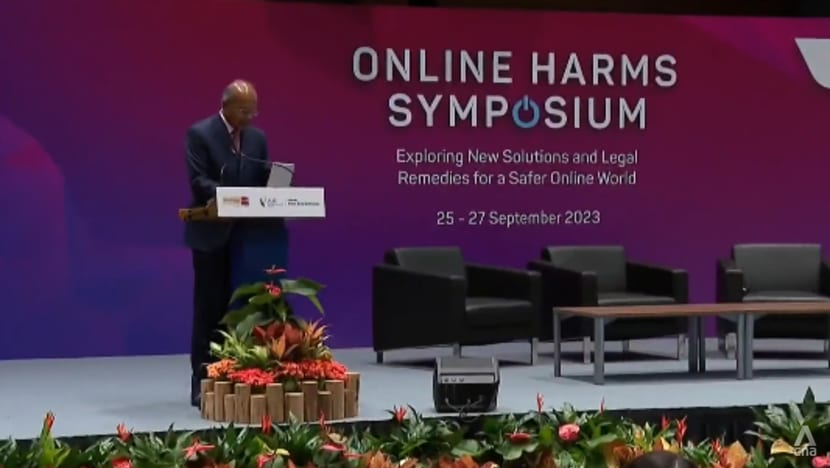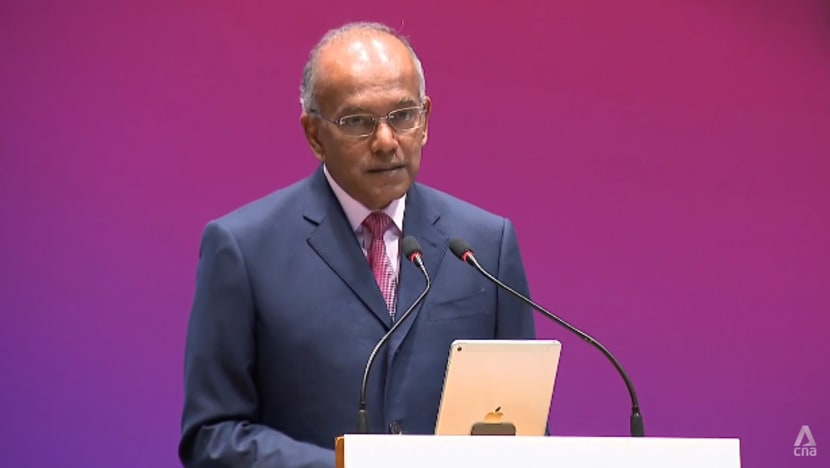‘A reality check’: Singapore calls for more laws to empower victims of harmful online content
More legal protection would empower those affected by cyberbullying and online sexual harassment to take action, said Law and Home Affairs Minister K Shanmugam.

Law and Home Affairs Minister K Shanmugam speaks during the Online Harms Symposium.
SINGAPORE: When “Eve” first started receiving hostile messages last year on a social networking app, she brushed them off as spam and ignored the sender.
But the messages kept appearing. Soon, they made their way into her other social media platforms, including being posted publicly on LinkedIn, where her professional connections could witness the harassment.
“The insults, name calling and abusive words just started coming … my immediate concern was, ‘are my colleagues, my employer, my clients going to see this?’ That caused me a lot of distress because I didn’t know what they would think of me,” she said.
“Their immediate questions might be like, ‘did Eve do something to cause all this harassment upon herself? Perhaps she deserves this treatment?’ It was very traumatising.”
The messages also started becoming more personal, with information about her private life, leading Eve to believe that the perpetrator was a close friend.
“In the beginning, it was just name calling and scolding me (profanities). But gradually, they started to be more specific, saying ‘I know where you work and live’. Then, our mutual friends’ names started popping up in the messages,” she told CNA in a wobbly voice.
“When my grandfather passed away, (the person) was able to take that information and weaponised it against me. I grew suspicious of everybody in my life.”
The perpetrator has since been dealt with by law enforcement, but Eve is still recovering from the traumatic experience.
For victims like her, an expansion of laws regulating online content can help to protect them from online harms, experts said.
MORE LAWS CAN EMPOWER VICTIMS: SHANMUGAM
Law and Home Affairs Minister K Shanmugam said on Monday (Sep 25) that more legal protection would empower those affected by cyberbullying and online sexual harassment to take action.
“There needs to be further laws to empower victims of online harms to take action and protect themselves. Societies all around the world, including us, are behind the curve in dealing with this effectively,” he said during the Online Harms Symposium.
The event, held at the Singapore Management University (SMU) from Monday to Wednesday, focuses on how individuals experience the online world.
The call comes on the back of major laws passed in November last year and two months ago in July to strengthen safety on the internet.
The Online Safety (Miscellaneous Amendments) Act requires social media sites to block access to harmful content, while the Online Criminal Harms Act (OCHA) allows the government to order the takedown of websites, apps and online accounts suspected to be used for criminal activities such.
However, Mr Shanmugam said there are still risks not covered by current laws, given the ever-changing nature of the internet.
For instance, when it comes to intimate photos uploaded without consent, it is uncertain what legal actions can be taken.
“The perpetrator is unknown. The victim can make a police report, but investigations will take time … there are legal uncertainties, and going to court will involve time and money. Meanwhile, damage is (already) done to the victims (in terms of) mental health, reputation, relationships,” said the minister.

EXPANSION OF LAWS NEEDED TO PLUG GAPS
In this area, authorities could look towards other countries which have in place laws and regulations aimed at preventing the non-consensual distribution of intimate content, said Assistant Professor Saifuddin Ahmed, from the Wee Kim Wee School of Communication and Information at the Nanyang Technological University (NTU).
“The overall goal is to provide support and protection to individuals whose privacy and dignity have been violated by the content online,” Prof Saifuddin told CNA’s Singapore Tonight.
“The US, UK, Australia, have implemented these laws. (They) can be studied to identify the areas that have worked and those which may need improvement, especially the areas which can be applied in the Singaporean context.”
Prof Saifuddin said that before expanding the laws, authorities need to identify areas that need more attention. One such area of particular concern would be deepfakes, which cases have increased the past few years, he added.
However, he acknowledged that implementation and enforcement of such laws could face challenges as online content can be uploaded anywhere in the world, and the constant evolution of technology means malicious actors can continue to find ways to hide.
“Investment in advanced digital forensics could be one way to trace these sources. Also, strengthening data protection and privacy regulations could prevent data misuse by overseas actors,” he said, adding that international cooperation and agreements on internet regulation can facilitate cross-border investigations.
ONLINE HARMS SURVEY RESULTS ‘SOBERING’
During the symposium, Mr Shanmugam pointed to a recent study by non-profit organisation SG Her Empowerment (SHE), showing that 38 per cent of respondents have encountered harmful online content.
This is more common among youths, with two-third of respondents having experienced online harms, showed a separate survey conducted by the National Youth Council.
Mr Shanmugam said continued exposure can have a serious impact.
“The survey findings are quite sobering. It is a reality check. You really can’t have generations of young people growing up with these issues. Their mental health, amongst other things, will be seriously affected,” he said.
“(Victims) have their self-confidence shattered, traumatised, victimised, bullied and we have generations growing up like that. Most individuals say they want practical solutions.”
The issues were discussed during the symposium, which includes attendees such as academics, major tech firms, and supreme court judges.
The event also featured a panel of victims, including Eve, who shared her experience with cyberstalking and harassment.
She joined the panel to contribute to more awareness on the different kinds of online harms, and to call for more to be done to protect and empower victims.
“My case is not as severe as compared to a lot of other people who have experienced online harms,” she said.
“But I do wish someone could look into how the laws governing this space can be improved so that victims, like myself, can be protected.”















